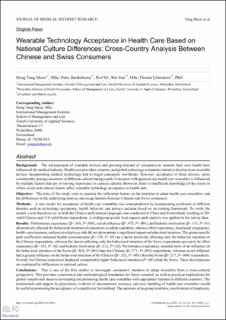Please use this identifier to cite or link to this item:
https://doi.org/10.21256/zhaw-20499| Publication type: | Article in scientific journal |
| Type of review: | Peer review (publication) |
| Title: | Wearable technology acceptance in health care based on national culture differences : cross-country analysis between Chinese and Swiss consumers |
| Authors: | Yang Meier, Dong Barthelmess, Petra Sun, Wei Liberatore, Florian |
| et. al: | No |
| DOI: | 10.2196/18801 10.21256/zhaw-20499 |
| Published in: | Journal of Medical Internet Research |
| Volume(Issue): | 22 |
| Issue: | 10 |
| Page(s): | e18801 |
| Issue Date: | 2020 |
| Publisher / Ed. Institution: | JMIR Publications |
| ISSN: | 1438-8871 |
| Language: | English |
| Subject (DDC): | 610: Medicine and health |
| Abstract: | Background: The advancement of wearable devices and growing demand of consumers to monitor their own health has influenced the medical industry. Healthcare providers, insurers, and global technology companies intend to develop more wearable devices incorporating medical technology and to target consumers worldwide. However, acceptance of these devices varies considerably among consumers of different cultural backgrounds. Consumer willingness to use healthcare wearables is influenced by multiple factors that are of varying importance in various cultures. How social and cultural factors affect wearable technology acceptance in healthcare is an area where there is insufficient knowledge. Objective: This paper examines the intention to adopt healthcare wearables and the differences in the underlying motives and usage barriers of Chinese and Swiss consumers adopting healthcare wearables. Methods: A new model for acceptance of healthcare wearables was conceptualized by incorporating predictors of different theories such as technology acceptance, health behavior, and privacy calculus based on an existing framework of wearables acceptance. To verify the model, a web-based survey in both Chinese and German was conducted in China and Switzerland, which produced 201 valid Chinese and 110 valid Swiss respondents, and their responses were included in the results. A multigroup PLS path analysis was applied to the survey data. Results: The analyses of the data revealed that performance expectancy (PE), social influence (SI), hedonic motivation (HM), and effort expectancy (EE) positively affect behavioral intention (BI) of consumers to adopt wearables; functional congruence (FC), health consciousness (HC), and perceived privacy risk (PPR) did not demonstrate any significant impact on BI. While the multigroup analysis indicated HC as a factor affecting only the BI of the Chinese respondents positively, the factors affecting only the BI of the Swiss respondents proved to be EE and HM. PE asserts more influence on the BI of the Swiss respondents, while SI was of more influence on the BI of the Chinese respondents. Overall, the Chinese consumers displayed considerably higher BI than the Swiss. These discrepancies are explained by differences in national culture. Conclusions: This paper is one of the first studies to investigate consumers’ intention to adopt wearables from a cross-cultural perspective. This provides a theoretical and methodological foundation for future research, as well as practical implications for global vendors and insurers developing and promoting healthcare wearables with appropriate features in different countries. The testimonial and support by physicians, evidence of measurement accuracy, as well as easy handling of healthcare wearables would be useful in promoting the acceptance of wearables in Switzerland. The opinions of in-group members, involvement of Chinese employers, multifunctional apps providing credible healthcare advices and solutions in cooperation with healthcare institutions would increase acceptance among the Chinese. |
| URI: | https://digitalcollection.zhaw.ch/handle/11475/20499 |
| Fulltext version: | Published version |
| License (according to publishing contract): | CC BY 4.0: Attribution 4.0 International |
| Departement: | School of Management and Law |
| Organisational Unit: | International Management Institute (IMI) Winterthur Institute of Health Economics (WIG) |
| Appears in collections: | Publikationen School of Management and Law |
Files in This Item:
| File | Description | Size | Format | |
|---|---|---|---|---|
| 2020_Yang-Meier-etal_Wearable-technology-acceptance-health-care.pdf | 491.17 kB | Adobe PDF |  View/Open |
Show full item record
Yang Meier, D., Barthelmess, P., Sun, W., & Liberatore, F. (2020). Wearable technology acceptance in health care based on national culture differences : cross-country analysis between Chinese and Swiss consumers. Journal of Medical Internet Research, 22(10), e18801. https://doi.org/10.2196/18801
Yang Meier, D. et al. (2020) ‘Wearable technology acceptance in health care based on national culture differences : cross-country analysis between Chinese and Swiss consumers’, Journal of Medical Internet Research, 22(10), p. e18801. Available at: https://doi.org/10.2196/18801.
D. Yang Meier, P. Barthelmess, W. Sun, and F. Liberatore, “Wearable technology acceptance in health care based on national culture differences : cross-country analysis between Chinese and Swiss consumers,” Journal of Medical Internet Research, vol. 22, no. 10, p. e18801, 2020, doi: 10.2196/18801.
YANG MEIER, Dong, Petra BARTHELMESS, Wei SUN und Florian LIBERATORE, 2020. Wearable technology acceptance in health care based on national culture differences : cross-country analysis between Chinese and Swiss consumers. Journal of Medical Internet Research. 2020. Bd. 22, Nr. 10, S. e18801. DOI 10.2196/18801
Yang Meier, Dong, Petra Barthelmess, Wei Sun, and Florian Liberatore. 2020. “Wearable Technology Acceptance in Health Care Based on National Culture Differences : Cross-Country Analysis between Chinese and Swiss Consumers.” Journal of Medical Internet Research 22 (10): e18801. https://doi.org/10.2196/18801.
Yang Meier, Dong, et al. “Wearable Technology Acceptance in Health Care Based on National Culture Differences : Cross-Country Analysis between Chinese and Swiss Consumers.” Journal of Medical Internet Research, vol. 22, no. 10, 2020, p. e18801, https://doi.org/10.2196/18801.
Items in DSpace are protected by copyright, with all rights reserved, unless otherwise indicated.